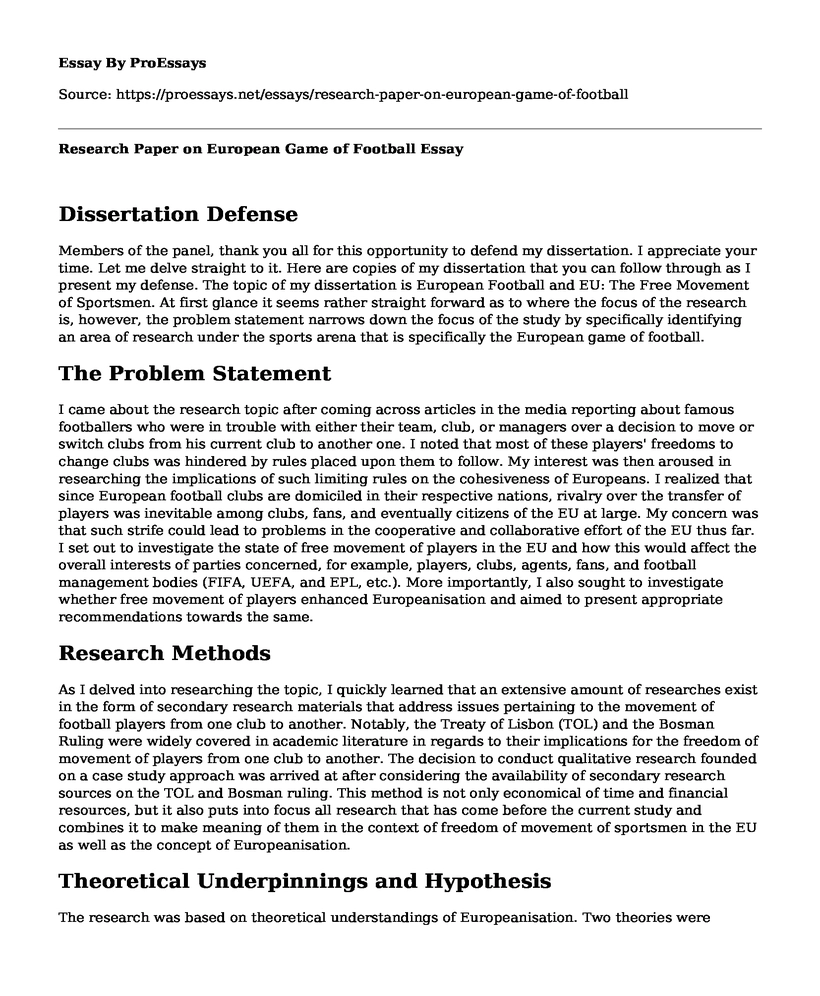Dissertation Defense
Members of the panel, thank you all for this opportunity to defend my dissertation. I appreciate your time. Let me delve straight to it. Here are copies of my dissertation that you can follow through as I present my defense. The topic of my dissertation is European Football and EU: The Free Movement of Sportsmen. At first glance it seems rather straight forward as to where the focus of the research is, however, the problem statement narrows down the focus of the study by specifically identifying an area of research under the sports arena that is specifically the European game of football.
The Problem Statement
I came about the research topic after coming across articles in the media reporting about famous footballers who were in trouble with either their team, club, or managers over a decision to move or switch clubs from his current club to another one. I noted that most of these players' freedoms to change clubs was hindered by rules placed upon them to follow. My interest was then aroused in researching the implications of such limiting rules on the cohesiveness of Europeans. I realized that since European football clubs are domiciled in their respective nations, rivalry over the transfer of players was inevitable among clubs, fans, and eventually citizens of the EU at large. My concern was that such strife could lead to problems in the cooperative and collaborative effort of the EU thus far. I set out to investigate the state of free movement of players in the EU and how this would affect the overall interests of parties concerned, for example, players, clubs, agents, fans, and football management bodies (FIFA, UEFA, and EPL, etc.). More importantly, I also sought to investigate whether free movement of players enhanced Europeanisation and aimed to present appropriate recommendations towards the same.
Research Methods
As I delved into researching the topic, I quickly learned that an extensive amount of researches exist in the form of secondary research materials that address issues pertaining to the movement of football players from one club to another. Notably, the Treaty of Lisbon (TOL) and the Bosman Ruling were widely covered in academic literature in regards to their implications for the freedom of movement of players from one club to another. The decision to conduct qualitative research founded on a case study approach was arrived at after considering the availability of secondary research sources on the TOL and Bosman ruling. This method is not only economical of time and financial resources, but it also puts into focus all research that has come before the current study and combines it to make meaning of them in the context of freedom of movement of sportsmen in the EU as well as the concept of Europeanisation.
Theoretical Underpinnings and Hypothesis
The research was based on theoretical understandings of Europeanisation. Two theories were selected as a basis for the evaluation of Europeanisation. Providing two theories offers the study alternative routes of the line of thought, hence, allowing for the accommodation of variations in thought concerning the concept of Europeanisation. My hypothesis stemmed from the line of thought that Europeanisation is likely to be hindered when freedoms of sportsmen are denied in the EU. Therefore, liberating freedoms of sportsmen, to change clubs as they wish, will have an implication of unifying Europeans at large, as well as serving the interests of parties involved. On the flipside, the null hypothesis was that assuring freedom of movement for football players, and sportsmen at large, has no implication in enhancing Europeanisation or serving the interests of parties involved.
The Significance of the Study
I find this study to be important because of its novelty, in that, no research exists currently that evaluates the future cooperation of the EU through the enhancement of understanding among member states in the sports arena. Specifically, the research looks into avenues where sports can be utilized as a unifying factor that then serves to strengthen the ties among members of the EU community. In that regard, the recommendations that arise from the study are not just key to improving the relationship between players, their clubs, football governing agencies, and the EU, at large. It also serves to enhance cooperation and coordination in the context of the EU. Moreover, the findings of the study prove necessary in the fields of politics and governance considering that the ramifications of the findings are meant to develop proposals for enhancing Europeanisation. Therefore, the findings of this research will not only be applicable to the current research on sports governance and cohesiveness of EU member states but also contribute to the already existing research on the implications of freedom of sportsmen movement. Finally, this research is significant in my career pursuits as I intend to join sports management in the future. I believe that this study positions me uniquely as it is at the core of the challenges facing sportsmen.
Cite this page
Research Paper on European Game of Football. (2022, Nov 19). Retrieved from https://proessays.net/essays/research-paper-on-european-game-of-football
If you are the original author of this essay and no longer wish to have it published on the ProEssays website, please click below to request its removal:
- Essay Example on Fitness Industry Analysis
- Should NCAA Athletes Get Paid as Employees? Research Paper Example
- Title IX Debate: The Issue of the Inclusion of College Football
- Should Professional Athletes be Paid Millions of Dollars? - Argumentative Essay
- Paper Example on Professional Soccer Athletes: Physical Training & Strategies
- Essay on Nutrition: Knowing Macronutrients Is Key for Achieving Fitness Goals
- Big Five Leagues Lead Football's Record - Report Sample







